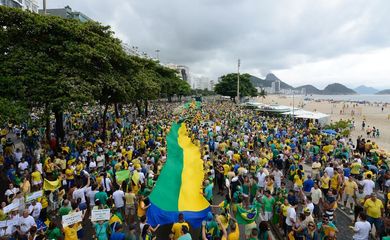Demonstrations in Brazil a sign of overarching political crisis
The rallies staged Sunday (Mar. 13) showed that Brazil is currently going through an overarching political crisis, experts heard by Agência Brasil say.

Even though demonstrators focused their protest on corruption schemes, President Dilma Rousseff's administration and the Workers' Party (PT), Pablo Ortellado, Public Policy Management Professor, said the crisis cannot be associated with the PT administration alone. “Rousseff is its utmost expression, but I think we're not going to see stability anytime soon. What's triggered the mobilization is the probes under Operation Car Wash, which have targeted all political parties. The investigation affects the PT, the PMDB, and the PSDB. This has been causing an overarching crisis, and we'll see what solution Brazil is going to find to that, because we have but a few actors still worthy of credibility,” said Ortellado, who attended the rallies and has studied street demonstrations in São Paulo over the past few years.
In the professor's view, the fact that politicians were met with boos and antagonized during the demonstration held on Paulista Avenue, like São Paulo Governor Alckmin and Senator Aécio Neves, both PSDB members, shows that protesters are dissatisfied with all political parties.
“The PT is not the only party assailed by distrust. In the protesters' opinion, the PT is an extreme case of corruption, but they believe corruption is deep-rooted and spread through all political parties. Distrust isn't only in the political parties, but also among its main leaders,” Professor Ortellado argued.
In his view, political instability may pave the way for a “dangerous situation in which some outsider may stand behind an antipolitical discourse. It's what happened in Italy with Berlusconi, and it's what's happening now with Trump, in the US—someone from outside the political system who seeks to fix that, without clear political programs.”
Lack of representation
Political scientist Márcio Malta, from the Fluminense Federal University (UFF), say he believes the political crisis is a structural issue. “It's a structural crisis in terms of a lack of lack of representation towards all politicians: Cunha [Eduardo Cunha, lower house speaker], Temer [Michel Temer, vice-president], the PSDB, the PT. It is as if they were saying: we're not feeling represented by these politicians in the presidency and Congress. Part of the population taking to the streets also rejects this kind of behavior of some politicians, who attempt to take advantage of this sort of protest,” he said.
Professor Malta maintains that the country lacks an agenda. In his judgment, the solution comes with plans, a political reform, and effective political funding of campaigns. “The political class has a duty. It must see these protests through the perspective of what's sending these people out to the streets and why so many people are dissatisfied with the government. The picture is rather complex, but the Constitution must be respected.”
He further mentions the economic crisis as a factor increasing people's discontent. “It's decisive. As the middle-class loses purchasing power, dissatisfaction and indignation arises. But the institutions must not be shaken, for instance, by an economic crisis. They must respect the election of the president. And the opposition, if dissatisfied, should prepare for the next election,” he stated.
Translated by Fabrício Ferreira
Fonte: Demonstrations in Brazil a sign of overarching political crisis




